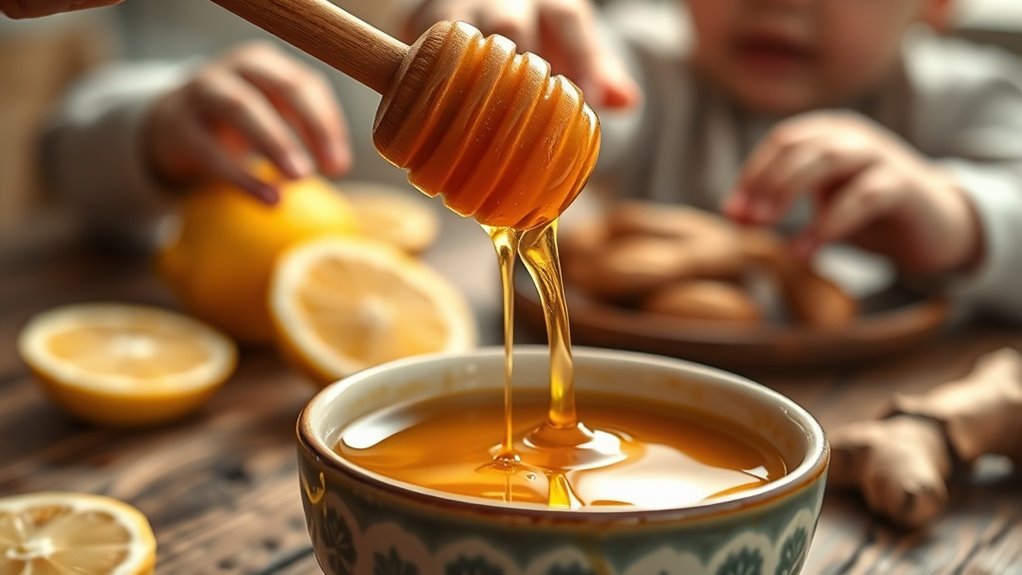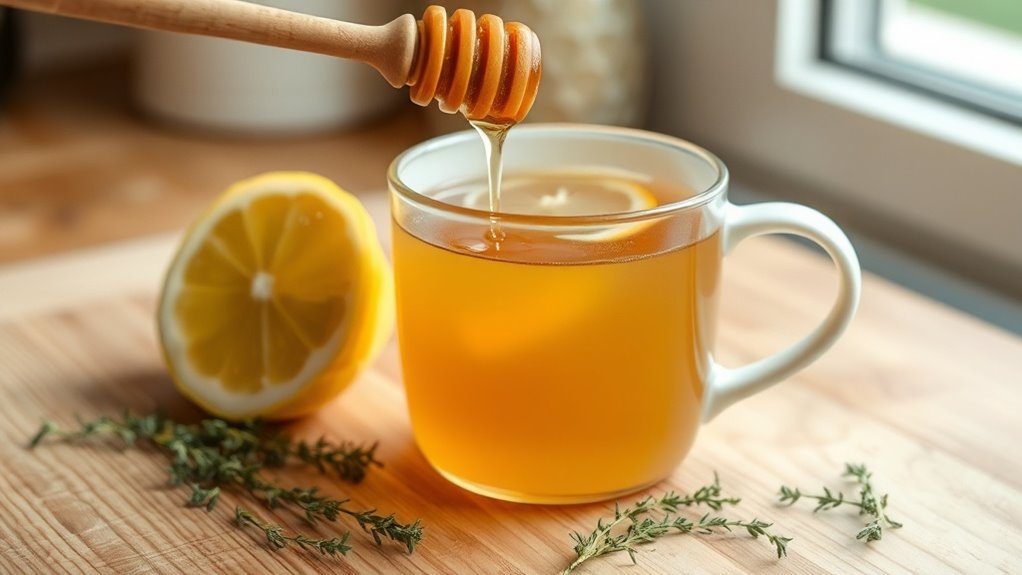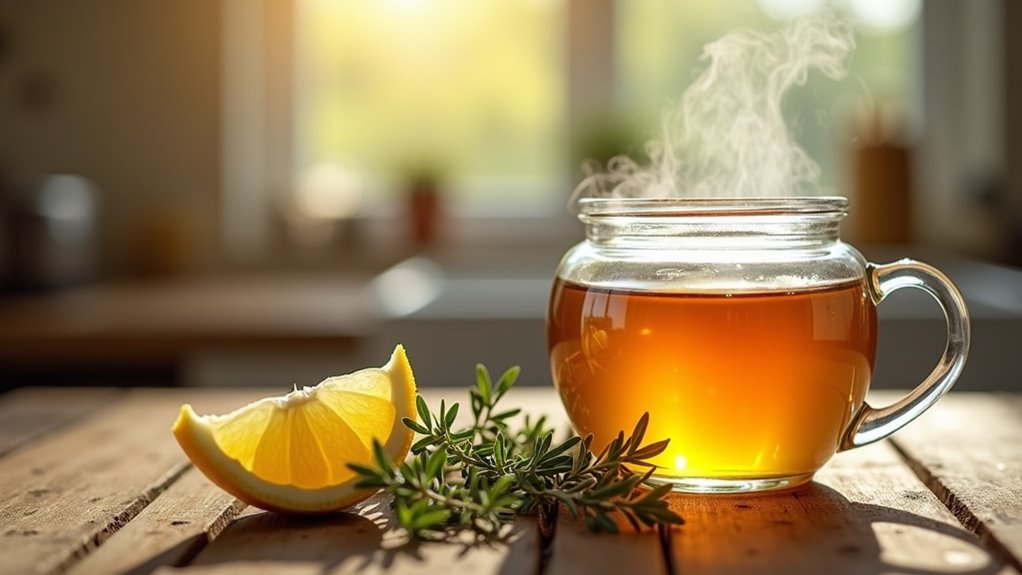What Are 8 Natural Cough Remedies for Kids That Parents Trust.
Your child’s nighttime cough is keeping the whole house awake, and you’ve just discovered that most drugstore cough medicines aren’t even recommended for young kids. The good news? Eight natural remedies using ingredients you probably already have may help soothe that cough in as little as 30 minutes—no pharmacy run required. From honey to steam therapy, these parent-trusted methods offer gentle relief you can try right now. Here’s what actually delivers results when your little one needs comfort fast.
Honey: Nature’s Sweet Cough Suppressant
Looking for a natural way to soothe your child’s nighttime cough? Honey stands out among cough remedies for kids as a scientifically-backed solution. Research shows that a spoonful of honey before bedtime reduces cough frequency and severity in children over one year old.
It coats the throat, providing instant relief while its antimicrobial properties support healing. You can offer it straight from the spoon or mix it into warm water or herbal tea. For an even more effective remedy, combine honey with fresh lemon juice and ginger to create a soothing throat mixture that kids actually enjoy taking. Remember, never give honey to infants under 12 months due to botulism risk. For older children, it’s an effective, sweet-tasting alternative to over-the-counter medications.
Steam Therapy: Moisture That Soothes Irritated Airways
Steam therapy works by adding moisture to your child’s airways, which loosens mucus and reduces the inflammation causing their cough. You can create a safe steam treatment by running a hot shower and sitting with your child in the bathroom for 10-15 minutes, or by using a cool-mist humidifier in their bedroom.
The best times for steam therapy are before bed to promote better sleep and first thing in the morning when congestion is typically worst.
For children over 6 years, you can enhance steam therapy by adding a few drops of diluted peppermint oil to ease breathing and open congested airways.
How Steam Reduces Congestion
When your child’s airways become inflamed and filled with thick mucus, warm moisture can provide immediate relief by thinning secretions and making them easier to expel. The steam works by increasing humidity in the respiratory tract, which loosens stubborn phlegm that triggers coughing fits.
As your child breathes in the warm vapor, it hydrates dried-out nasal passages and throat tissues, reducing irritation that causes persistent coughs. You’ll notice the steam also helps open constricted airways, allowing your child to breathe more comfortably. This simple remedy provides natural relief without medications, making it safe for regular use.
Safe Steaming Methods Home
You can harness steam’s healing power through several parent-supervised methods that keep your child safe while maximizing relief. Run a hot shower and sit with your child in the steamy bathroom for 10-15 minutes, keeping them away from hot water.
Use a cool-mist humidifier in their bedroom, cleaning it daily to prevent mold growth. For older children, create a steam tent by draping a towel over their head while they lean over a bowl of hot water—always supervise this method.
Never leave children unattended during any steam therapy, and ensure water isn’t hot enough to cause burns.
Best Times for Treatment
Timing your steam therapy sessions strategically can double their effectiveness in calming your child’s cough. You’ll want to schedule treatments when they provide maximum relief and fit naturally into your routine.
Consider these optimal timing strategies:
- Before bedtime – Steam sessions 30 minutes prior to sleep clear airways and reduce nighttime coughing fits
- After school or daycare – Evening treatments wash away accumulated irritants from daily exposure
- Morning wake-up – A brief session loosens overnight mucus buildup and starts the day fresh
You can also add sessions during severe coughing episodes for immediate soothing relief.
Warm Fluids: Hydration That Loosens Mucus
Warm fluids work double duty when your child has a cough—they keep kids hydrated while simultaneously thinning out stubborn mucus. Offer warm water, herbal teas, or broths throughout the day. The steam from these beverages helps loosen chest congestion, making it easier for your child to expel phlegm.
For children over one year, you can add honey to warm water or tea for additional soothing benefits. Avoid caffeinated drinks, as they’ll dehydrate rather than help. Keep a thermos nearby so warm liquids stay accessible. You’ll notice your child coughs more productively after drinking, which means the treatment’s working. Consider adding ginger to warm tea, as ginger tea reduces inflammation and provides additional throat-soothing properties.
Elevating the Head: Better Sleep Position for Cough Relief
When mucus drains into the throat during sleep, it triggers persistent coughing that disrupts your child’s rest. Elevating your child’s head reduces postnasal drip and eases breathing throughout the night.
For safe elevation, try these methods:
- Place a wedge pillow under the mattress to create a gentle incline for toddlers and older children
- Elevate the crib mattress by placing towels underneath (never use pillows for infants)
- Stack books under bed legs at the head end for a DIY solution
This simple adjustment helps gravity keep airways clearer, reducing nighttime coughing episodes significantly. Positioning your child at a 30-degree angle has been shown to effectively minimize postnasal drip and improve sleep quality during respiratory infections.
Humidifiers: Adding Moisture to Dry Air
Dry air irritates your child’s throat and nasal passages, making coughs more frequent and uncomfortable. A humidifier adds moisture to the air, soothing irritated airways and loosening mucus. Place it in your child’s bedroom during sleep for maximum benefit.
Choose a cool-mist humidifier to avoid burn risks. Clean it daily to prevent mold and bacteria growth. You’ll notice improvement within hours as the humid air eases breathing and reduces coughing fits.
Maintain indoor humidity between 30-50%. Too much moisture encourages dust mites and mold. Monitor levels with a hygrometer for optimal results. For additional relief, keep the room temperature between 68-72°F to create an optimal healing environment.
Saltwater Gargle: Simple Relief for Throat Irritation
A saltwater gargle cuts through throat pain and reduces inflammation that triggers your child’s cough. This time-tested remedy works by drawing out excess fluid from swollen throat tissues while creating an inhospitable environment for bacteria.
Mix the solution using these proportions:
- 1/4 teaspoon salt
- 8 ounces warm water
- Optional: 1/4 teaspoon baking soda for extra soothing power
Have your child gargle for 30 seconds, then spit it out. Repeat three times daily for best results. This method works well for kids over age six who’ve mastered gargling without swallowing the mixture. For added throat relief, you can follow the gargle with a spoonful of honey, which provides antimicrobial and antioxidant properties that further coat irritated throat membranes.
Ginger Tea: Anti-Inflammatory Properties for Respiratory Comfort
Ginger’s natural compounds work to reduce inflammation in your child’s airways, making breathing easier and calming irritated throat tissues. You can harness these benefits by preparing a mild ginger tea that’s both safe and effective for kids.
The key is using the right proportions and preparation methods to ensure the tea isn’t too strong for young palates while still delivering therapeutic effects.
How Ginger Reduces Inflammation
When your child struggles with a cough, inflammation in their respiratory tract often triggers the discomfort. Ginger contains powerful compounds called gingerols and shogaols that actively combat this inflammation. These bioactive substances work by:
- Blocking inflammatory pathways in the body’s immune response
- Reducing mucus production that contributes to persistent coughing
- Soothing irritated throat tissues through natural analgesic effects
You’ll find that ginger’s anti-inflammatory properties make it particularly effective for respiratory issues. The compounds inhibit prostaglandins and leukotrienes, which cause swelling and irritation. This natural approach helps your child breathe easier without relying on synthetic medications.
Preparing Safe Ginger Tea
Now that you understand ginger’s inflammation-fighting mechanisms, you’ll want to prepare it properly to maximize benefits while keeping your child safe. Start with fresh ginger root, peeling and slicing a quarter-inch piece.
Simmer it in two cups of water for ten minutes, then let it cool to a lukewarm temperature. For children over one year, add honey to soothe their throat. Strain the tea and serve small amounts—start with two ounces for toddlers, four ounces for older children. Never give hot tea directly, and always test temperature first to prevent burns.
Coconut Oil: A Natural Coating for Sore Throats
Coconut oil works as a protective barrier that coats and soothes inflamed throat tissues when your child swallows it. Its antimicrobial properties help fight infection while reducing irritation.
Give your child these age-appropriate amounts:
- Ages 2-5: Half teaspoon mixed into warm beverages
- Ages 6-12: One teaspoon straight or blended with honey
- Teens: One tablespoon as needed throughout the day
You’ll find virgin coconut oil most effective since it retains beneficial compounds. Let it melt slowly in your child’s mouth for maximum throat coverage. Administer before bedtime to provide overnight relief from persistent coughing.










